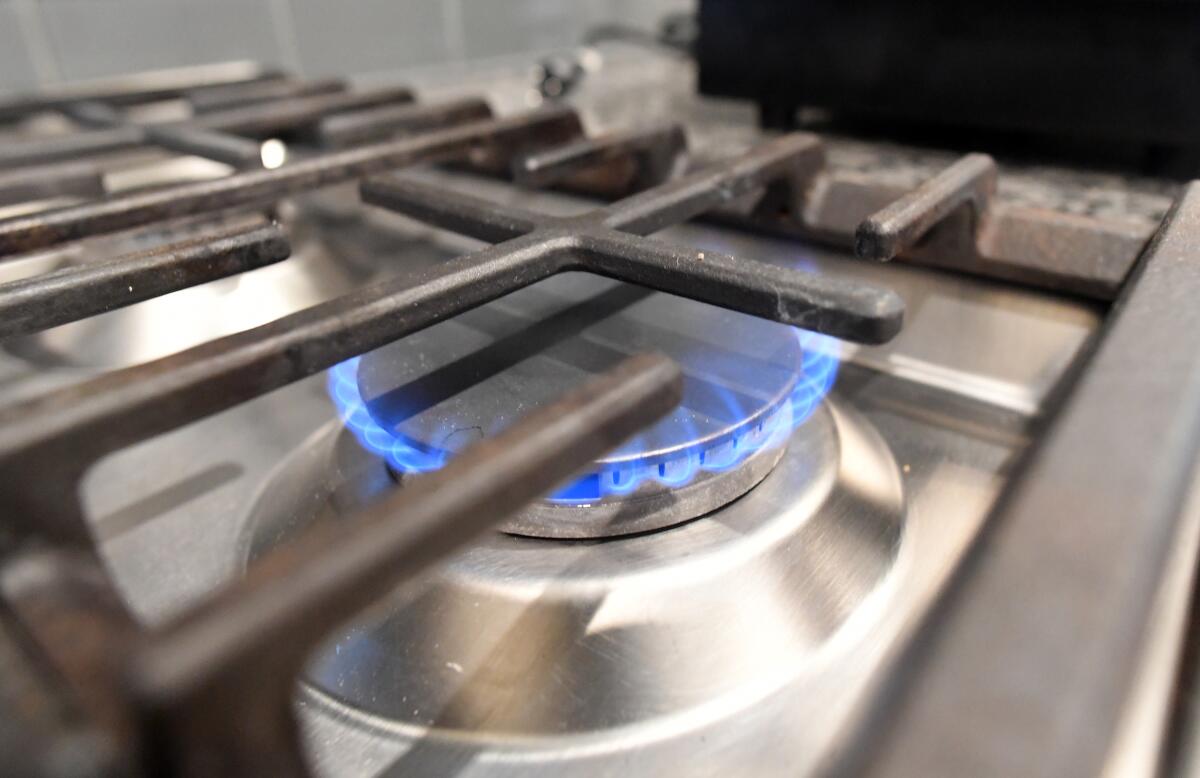Fight climate change and sea level rise. But take away my gas stove?

- Share via
It’s one thing to agree that climate change is a snowballing catastrophe that demands mitigation; it’s another to agree on what that mitigation should look like, especially if it involves letting go of the more carbon-intensive conveniences of modern life. Letters this week on banning natural gas hookups in new buildings and frightening new research on sea level rise show this dissonance at play.
In response to The Times’ article on a report predicting a century’s worth of sea level rise in the next 30 years, several readers wrote demanding swift action to work toward eliminating greenhouse gas emissions; among the most popular policies among the letters was a carbon fee that would make prices reflect the global warming costs of their products. But when The Times Editorial Board encouraged the city of Los Angeles to fight warming by requiring that new buildings be gas-free, most readers reacted coolly, citing the state’s already overburdened electrical grid and increased costs to consumers.
That global warming is a problem is no longer seriously disputed by most letter writers; count that as progress, I suppose. But when it comes to charting out the details of California’s path to a carbon-neutral future — gas cars versus electric cars, whether nuclear energy is “green” and, yes, gas appliances versus electric ones — there’s some disagreement about which turns to take.
————
To the editor: Megadrought, major sea level rise, devastating fires, biblical floods, disintegrating ice sheets, thawing permafrost, unstable Asian monsoons, ocean acidification, destruction of the Amazon and coral reefs — these are all staring us in the face, and still we barely flinch.
We are only seeing the beginning of climate change. Normal climate changes that take many thousands of years are now happening in decades. The atmospheric balance we’ve enjoyed for more than 10,000 years was tipped when we started burning millions of years of prehistoric fossil fuel, adding more carbon dioxide at a faster rate than ever.
Increasing carbon increases Earth’s temperature, which increases the amount of water in the atmosphere. Water is a feedback greenhouse gas that enhances the effects of carbon dioxide. Together this threatens irreversible tipping points that will remove all human control of our future.
The best time to stop burning fossil fuels was 40 years ago. The second-best time is now.
Phil Beauchamp, Chino Hills
..
To the editor: This article should serve as another wake-up call that action must be taken now to mitigate the climate crisis.
The most effective policy to reduce fossil fuel usage and therefore greenhouse gas emissions is to put a price on carbon. That policy provides a blanket approach to all uses of carbon fuels, not just motor vehicles.
Larry Kramer, San Juan Capistrano
..
To the editor: Your editorial on switching buildings from natural gas to electricity fails to address several important issues.
Electricity is subject to outages, whereas natural gas is not. Portions of California have been subject to multiple days-long power outages in the interest of wildfire prevention. If a residence is all electric, there will be no heat, no hot water and no cooking during outages.
In Los Angeles, electricity is appreciably more expensive than natural gas. This would increase utility bills, which would disproportionately affect people with low incomes.
Finally, induction cooktops, which use electricity, work only with induction-capable pots and pans. For most people, switching from natural gas to induction means purchasing all new pots and pans that are much more expensive.
Ellen Nadel, Los Angeles
..
To the editor: While your editorial welcoming the proposed change in building codes to ban new gas hookups is constructive, it ignores the essential code changes implicit in your statement, “To avert disastrous climate change and protect people’s health, [gas appliances] must be replaced with electric models powered by renewable energy.”
The massive California building boom of recent years, both residential and commercial, has proceeded without requiring solar panels, rain barrels or native plantings for all new structures. If these new buildings all had solar panels, we would have capacity by now to support all-electric buildings.
Next, we need battery capacity so that those of us in solar homes can cook with electricity when the grid goes down.
It is time for a massive overhaul of building codes in California, a climate ideally suited for renewable energy, rather than piecemeal approaches to household appliances.
Christine L. Borgman, Los Angeles
..
To the editor: So let me get this right.
Southern California does not have enough electric power to keep the lights on during a heat wave, yet the editorial board wants everyone to replace gas appliances with electric ones, and install heat pumps?
Brilliant. Those gas stoves allowed people (regardless of economic stability) to still cook a meal during blackouts.
I understand the environmental impact of natural gas. I also understand the environmental impact of creating electricity. Let’s just shut it all down, light some candles and plant a garden.
Oh, wait, there’s no water.
Clark Woodford, Palm Springs
..
To the editor: I doubled over in laughter. Where is all of this electricity going to come from?
We already suffer from so many blackouts because of a poor and inefficient electrical grid. I guess we can just live our lives in the dark and the excessive heat, and not be able to cook as well.
Quite a life to look forward to.
Peter David Harris, Los Angeles










